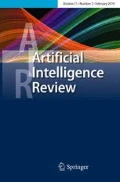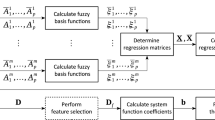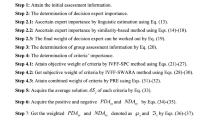Abstract
This survey reviews recent researches conducted on the application of fuzzy approaches to Case-Based Reasoning (CBR) dealing with real-time applications. Fuzzy approaches have been effectively applied for knowledge representation, feature selection, and learning in CBR. Dealing with imprecise and uncertain knowledge, generalization, mining, and learning also in combination with low computational complexity are the main advantages of fuzzy approaches used in the CBR context. This paper presents and summarizes new findings on the integration of fuzzy approaches with CBR. The survey results highlight the advantages of fuzzy approaches in CBR for real-time applications. They show the current state of fuzzy-based CBR approaches. In addition, fuzzy approaches which are more operative for each operation in CBR are addressed. Those operations most contributing to the advantages of the fuzzy approach will be pointed out and detailed. Low accuracy, storage and computational challenges with a large amount of experiences and uncertainties are important issues in case of real-time applications. This paper proposes a general fuzzy-based CBR approach for real-time applications to benefit the advantages of previous approaches. Finally, some considerations of latest developments in fuzzy approaches which may be introduced as potential research directions for real-time applications are stated.







Similar content being viewed by others
References
Adhithyaa N, Sumathi P (2014) A survey on retrieval strategy for case-based reasoning using modified-USIMSCAR for objected oriented cases. Int J Adv Res Comput Sci 5(7):150–152
Amailef K, Lu J (2013) Ontology-supported case-based reasoning approach for intelligent m-government emergency response services. Decis Support Syst 55(1):79–97
An S, Hu Q, Yu D (2011) Case-based classifiers with fuzzy rough sets. Rough sets and knowledge technology, pp 172–177
Armengol E, Esteva F, Godo L, Torra V (2004) On learning similarity relations in fuzzy case-based reasoning. In: Transactions on rough sets II. Springer, pp 14–32
Aztiria A, Izaguirre A, Augusto JC (2010) Learning patterns in ambient intelligence environments: a survey. Artif Intell Rev 34(1):35–51
Begum S, Ahmed MU, Funk P, Xiong N, Von Schéele B (2009) A case-based decision support system for individual stress diagnosis using fuzzy similarity matching. Comput Intell 25(3):180–195
Begum S, Ahmed M U, Funk P, Xiong N, Folke M (2011) Case-based reasoning systems in the health sciences: a survey of recent trends and developments. IEEE Trans Syst Man Cybern C 41(4):421–434
Bergmann R, Kolodner J, Plaza E (2005) Representation in case-based reasoning. Knowl Eng Rev 20(03):209–213
Bichindaritz I (2008) Memory structures and organization in case-based reasoning. In: Case-based reasoning on images and signals. Springer, pp 175–194
Biswas SK, Das AK, Purkayastha B, Barman D (2013) Techniques for efficient case retrieval and rainfall prediction using CBR and fuzzy logic. Int J Electron Commun Comput Eng 4(3):692–698
Biswas SK, Sinha N, Purkayastha B (2014) A review on fundamentals of case-based reasoning and its recent application in different domains. Int J Adv Intell Paradig 6(3):235–254
Borrajo D, Roubíčková A, Serina I (2015) Progress in case-based planning. ACM Comput Surv 47(2):35
Cadena P, Garrido L (2011) Fuzzy case-based reasoning for managing strategic and tactical reasoning in starcraft. In: Mexican international conference on artificial intelligence. Springer, pp 113–124
Cao G, Shiu S, Wang X (2001) A fuzzy-rough approach for case base maintenance. In: International conference on case-based reasoning. Springer, pp 118–130
Castro JL, Navarro M, José MS, Zurita J M (2011) Introducing attribute risk for retrieval in case-based reasoning. Knowl Based Syst 24(2):257–268
Chandana S, Leung H, Bosse E, Valin P (2008) Fuzzy cognitive map based situation assessment for coastal surveillance. In: 11th international conference on information fusion. IEEE, pp 1–6
Chang P-C, Fan C-Y, Dzan W-Y (2010) A CBR-based fuzzy decision tree approach for database classification. Exp Syst Appl 37(1):214–225
Cheetham W, Shiu S, Weber RO (2005) Soft case-based reasoning. Knowl Eng Rev 20(3):267–269
Chumklin S, Auephanwiriyakul S, Theera-Umpon N (2010) Microcalcification detection in mammograms using interval type-2 fuzzy logic system with automatic membership function generation. In: IEEE international conference on fuzzy systems (FUZZ). IEEE, pp 1–7
Davis R, Shrobe H, Szolovits P (1993) What is a knowledge representation? AI Magazine 14(1):17
Davoust A, Floyd MW, Esfandiari B (2008) Use of fuzzy histograms to model the spatial distribution of objects in case-based reasoning. In: Conference of the Canadian society for computational studies of intelligence. Springer, pp 72–83
Derrac J, Cornelis C, García S, Herrera F (2012) Enhancing evolutionary instance selection algorithms by means of fuzzy rough set based feature selection. Inf Sci 186(1):73–92
Dillon TS, Pal SK, Yeung DS (2012) Soft computing in case based reasoning. Springer, New York
Douali N, Papageorgiou EI, De Roo J, Jaulent MC (2011) Case based fuzzy cognitive maps (CBFCM): new method for medical reasoning: comparison study between CBFCM/FCM. In: IEEE international conference on fuzzy systems (FUZZ). IEEE, pp 844–850
Dubois D, Hullermeier E, Prade H (2002) Fuzzy set-based methods in instance-based reasoning. IEEE Trans Fuzzy Syst 10(3):322–332
Fernandez-Riverola F, Diaz F, Corchado J M (2007) Reducing the memory size of a fuzzy case-based reasoning system applying rough set techniques. IEEE Trans Syst Man Cybern C 37(1):138–146
Floyd M, Davoust A, Esfandiari B (2008) Considerations for real-time spatially-aware case-based reasoning: a case study in robotic soccer imitation. Adv Case-Based Reaso, pp 195–209
Ganganath N, Walker M, Leung H (2013) Fuzzy cognitive map based situation assessment framework for navigation goal detection. In: IEEE International conference on systems, man, and cybernetics (SMC). IEEE, pp 1444–1449
Georgopoulos VC, Stylios CD (2008) Complementary case-based reasoning and competitive fuzzy cognitive maps for advanced medical decisions. Soft Comput 12(2):191–199
Golmohammadi SK, Azadeh A, Gharehgozli A (2006) Action selection in robots based on learning fuzzy cognitive map. In: IEEE international conference on industrial informatics. IEEE, pp 731–736
Hammond KJ (2012) Case-based planning: viewing planning as a memory task. Elsevier, New York
Huang C, Zhong S, Li X, Zhang F, Chen J, Su G, Huang Q, Yuan H (2014) Emergency case retrieval based on fuzzy sets and text mining. In: Foundations of intelligent systems. Springer, pp 911–919
Hüllermeier E (2007) Case-based approximate reasoning, vol 44. Springer, New York
Jeng BC, Liang T-P (1995) Fuzzy indexing and retrieval in case-based systems. Exp Syst Appl 8(1):135–142
Jensen R, Cornelis C (2011) Fuzzy-rough nearest neighbour classification and prediction. Theor Comput Sci 412(42):5871–5884
Kendall-Morwick J, Leake D (2014) A study of two-phase retrieval for process-oriented case-based reasoning. In: Successful case-based reasoning applications-2. Springer, pp 7–27
Khanum A, Mufti M, Javed MY, Shafiq MZ (2009) Fuzzy case-based reasoning for facial expression recognition. Fuzzy Sets Syst 160(2):231–250
Kofod-Petersen A, Andersen OJ, Aamodt A (2014) Case-based reasoning for improving traffic flow in urban intersections. In: International conference on case-based reasoning. Springer, pp 215–229
Kolodner J (2014) Case-based reasoning. Morgan Kaufmann, Burlington
Kuo RJ, Kuo YP, Chen K-Y (2005) Developing a diagnostic system through integration of fuzzy case-based reasoning and fuzzy ant colony system. Exp Syst Appl 28(4):783–797
Lee S, Yang J, Han J (2012) Development of a decision making system for selection of dental implant abutments based on the fuzzy cognitive map. Exp Syst Appl 39(14):11564–11575
Lejri O, Tagina M (2012) Representation in case-based reasoning applied to control reconfiguration. In ICDM. Springer, New York, pp 113–120
Lenz M, Bartsch-Spörl B, Burkhard H, Wess S (2003) Case-based reasoning technology: from foundations to applications, vol 1400. Springer, New York
Li S-T, Ho H-F (2009) Predicting financial activity with evolutionary fuzzy case-based reasoning. Exp Syst Appl 36(1):411–422
Lin G, Qian Y, Li J (2012) NMGRS: Neighborhood-based multigranulation rough sets. Int J Approx Reason 53(7):1080–1093
Mahdi W, Soui M, Abed M (2014) A new personalization approach by case-based reasoning and fuzzy logic. In: International conference on advanced logistics and transport (ICALT). IEEE, pp 103–108
Maher ML, Pu P (2014) Issues and applications of case-based reasoning to design. Psychology Press, Abingdon
Maher ML, Balachandran MB, Zhang DM (2014) Case-based reasoning in design. Psychology Press, Abingdon
Mantaras RLD, Lopez R, McSherry D, Bridge D, Leake D, Smyth B, Craw S, Faltings B, Maher ML, COX MT, Forbus K et al (2005) Retrieval, reuse, revision and retention in case-based reasoning. Knowl Eng Rev 20(03):215–240
Markman AB (2013) Knowledge representation. Psychology Press, Abingdon
Mohamadnejad F, Jassbi J (2012) A fuzzy inference system platform for simulating cause and effect relationships of strategy map. In: IEEE international conference on fuzzy systems (FUZZ-IEEE). IEEE, pp 1–8
Montani S (2011) How to use contextual knowledge in medical case-based reasoning systems: a survey on very recent trends. Artif Intell Med 51(2):125–131
Nasiri Sara, Zenkert Johannes, Fathi Madjid (2017) Improving CBR adaptation for recommendation of associated references in a knowledge-based learning assistant system. Neurocomputing 250:5–17
Nikitenko A (2008) Knowledge-based robot control. Int J ITA 15(2):126–137
Nwiabu N, Allison I, Holt P, Lowit P, Oyeneyin B (2011) Situation awareness in context-aware case-based decision support. In IEEE First international multi-disciplinary conference on cognitive methods in situation awareness and decision support (CogSIMA), 2011. IEEE, pp 9–16
Nwiabu N, Allison I, Holt P, Lowit P, Oyeneyin B (2012) Case-based situation awareness. In IEEE international multi-disciplinary conference on cognitive methods in situation awareness and decision support (CogSIMA), 2012. IEEE, pp 22–29
Pal SK, Shiu SC (2004) Foundations of soft case-based reasoning, vol 8. Wiley, New Jersey
Papageorgiou EI (2011) A new methodology for decisions in medical informatics using fuzzy cognitive maps based on fuzzy rule-extraction techniques. Appl Soft Comput 11(1):500–513
Papageorgiou EI, Salmeron JL (2013) A review of fuzzy cognitive maps research during the last decade. IEEE Trans Fuzzy Syst 21(1):66–79
Perner P (2014) Case-based reasoning and the statistical challenges II. In: Man-machine interactions vol 3. Springer, New York, pp 17–38
Rezvan MT, Hamadani AZ, Shalbafzadeh A (2013) Case-based reasoning for classification in the mixed data sets employing the compound distance methods. Eng Appl Artif Intell 26(9):2001–2009
Richter MM, Weber RO (2016) Case-based reasoning. Springer, Berlin
Riesbeck CK, Schank RC (2013) Inside case-based reasoning. Psychology Press, Abingdon
Riza LS, Janusz A, Bergmeir C, Cornelis C, Herrera F, Śle D, Benítez JM et al (2014) Implementing algorithms of rough set theory and fuzzy rough set theory in the r package “roughsets”. Inf Sci 287:68–89
Rodriguez RM, Martinez L, Herrera F (2012) Hesitant fuzzy linguistic term sets for decision making. IEEE Trans Fuzzy Syst 20(1):109–119
Ros R, Arcos JL, De Mantaras RL, Veloso M (2009) A case-based approach for coordinated action selection in robot soccer. Artif Intell 173(9–10):1014–1039
Ruan D, Hardeman F, Mkrtchyan L (2011) Using belief degree-distributed fuzzy cognitive maps in nuclear safety culture assessment. In: Annual meeting of the North American fuzzy information processing society. IEEE, pp 1–6
Ruet M, Geneste L (2002) Search and adaptation in a fuzzy object oriented case base. In: European conference on case-based reasoning. Springer, pp 350–364
Salamó M, López-Sánchez M (2011) Rough set based approaches to feature selection for case-based reasoning classifiers. Pattern Recognit Lett 32(2):280–292
Sarkheyli-Hägele Arezoo, Söffker Dirk (2017a) Fuzzy som-based case-based reasoning for individualized situation recognition applied to supervision of human operators. Knowl Based Syst 137:42–53
Sarkheyli-Hägele A, Söffker D (2017b) Online learning for an individualized lane-change situation recognition system applied to driving assistance. In: IEEE conference on cognitive and computational aspects of situation management (CogSIMA). IEEE, pp 1–6
Sarkheyli A, Söffker D (2016a) Feature selection for situation recognition in fuzzy SOM-based case-based reasoning. In: International multi-disciplinary conference on cognitive methods in situation awareness and decision support (CogSIMA). IEEE, pp 145–151
Sarkheyli A, Söffker D (2016b) Automatic selection of relevant features using rough set theory for real-time situation recognition based on fuzzy som-based cbr. In: International conference on systems, man, and cybernetics (SMC). IEEE, pp 832–837
Serina I (2010) Kernel functions for case-based planning. Artif Intell 174(16):1369–1406
Sharma RK, Kumar D, Kumar P (2005) FLM to select suitable maintenance strategy in process industries using MISO model. J Qual Maint Eng 11(4):359–374
Shiu SC, Pal SK (2004) Case-based reasoning: concepts, features and soft computing. Appl Intell 21(3):233–238
Sigweni B, Shepperd M (2014) Feature weighting techniques for CBR in software effort estimation studies: a review and empirical evaluation. In: Proceedings of the 10th international conference on predictive models in software engineering. ACM, pp 32–41
Smiti A, Elouedi Z (2011) Overview of maintenance for case based reasoning systems. Int J Comput Appl 32(2):49–56
Smyth B (1998) Case-base maintenance. Tasks and methods in applied artificial intelligence, pp 507–516
Söffker D (2008) Interaction of intelligent and autonomous systems-part I: qualitative structuring of interaction. Math Comput Model Dyn Syst 14(4):303–318
Spalzzi L (2001) A survey on case-based planning. Artif Intell Rev 16(1):3–36
Sutanto DH, Herman NS, Ghani M, Abd K (2014) Trend of case based reasoning in diagnosing chronic disease: a review. Adv Sci Lett 20(10–11):1740–1744
Tadrat J, Boonjing V, Pattaraintakorn P (2012) A new similarity measure in formal concept analysis for case-based reasoning. Expert Syst Appl 39(1):967–972
Tanawong T (2017) Temporal fuzzy case-based reasoning retrieval. Chang Mai J Sci 44(1):267–278
Uusitalo L (2007) Advantages and challenges of bayesian networks in environmental modelling. Ecol Model 203(3):312–318
Vacek S, Gindele T, Zollner JM, Dillmann R (2007) Situation classification for cognitive automobiles using case-based reasoning. In: Intelligent vehicles symposium, 2007 IEEE, pp 704–709
Vascak J, Rutrich M (2008) Path planning in dynamic environment using fuzzy cognitive maps. In: 6th International symposium on applied machine intelligence and informatics, 2008. IEEE, pp 5–9
Vluymans S , D’eer L, Saeys Y, Cornelis C (2015) Applications of fuzzy rough set theory in machine learning: a survey. Fundam Inf 142(1–4):53–86
Voskoglou MG (2009) Fuzzy sets in case-based reasoning. In: Sixth international conference on fuzzy systems and knowledge discovery, 2009. FSKD’09
Wang ZY (2006) Developed case-based reasoning system for short-term load forecasting. In: Power engineering society general meeting, 2006. IEEE
Wei Ming, Dai Qiuxia (2016) A prediction model for traffic emission based on interval-valued intuitionistic fuzzy sets and case-based reasoning theory. J Intell Fuzzy Syst 31(6):3039–3046
Xiong N (2011) Learning fuzzy rules for similarity assessment in case-based reasoning. Exp Syst Appl 38(9):10780–10786
Xiong N (2013) Fuzzy rule-based similarity model enables learning from small case bases. Appl Soft Comput 13(4):2057–2064
Xiong N, Ma L, Zhang S (2013) Fuzzy relational learning: a new approach to case-based reasoning. In: 10th International conference on fuzzy systems and knowledge discovery (FSKD). IEEE, pp 594–599
Yahia NB, Bellamine N, Ghezala HB (2012) Integrating fuzzy case-based reasoning and particle swarm optimization to support decision making. Int J Comput Sci 9
Zarandi MF, Razaee ZS, Karbasian M (2011) A fuzzy case based reasoning approach to value engineering. Exp Syst Appl 38(8):9334–9339
Zhang J, Wong J-S, Li T, Pan Y (2014) A comparison of parallel large-scale knowledge acquisition using rough set theory on different mapreduce runtime systems. Int J Approx Reason 55(3):896–907
Zhang Z, Chen D, Feng Y, Yuan Z, Chen B, Qin W, Zou S, Qin S, Han J (2017) A strategy for enhancing the operational agility of petroleum refinery plant using case based fuzzy reasoning method. Comput Chem Eng 111:27–36
Zhao S, Tsang EC, Chen D, Wang X (2010) Building a rule-based classifier–a fuzzy-rough set approach. IEEE Trans Knowl Data Eng 22(5):624–638
Zhou M, Chen Z, He W, Chen X (2010) Representing and matching simulation cases: a case-based reasoning approach. Comput Ind Eng 59(1):115–125
Zhou P, Lu S-W, Chai T (2014) Data-driven soft-sensor modeling for product quality estimation using case-based reasoning and fuzzy-similarity rough sets. IEEE Trans Autom Sci Eng 11(4):992–1003
Zhu G-N, Hu J, Qi J, Ma J, Peng Y-H (2015) An integrated feature selection and cluster analysis techniques for case-based reasoning. Eng Appl Artif Intell 39:14–22
Acknowledgements
This research is partly supported by the German Academic Exchange Service (DAAD) through the Research Grants for Doctoral Candidates and Young Academics and Scientists, No. 57076385.
Author information
Authors and Affiliations
Corresponding author
Additional information
Publisher's Note
Springer Nature remains neutral with regard to jurisdictional claims in published maps and institutional affiliations.
Rights and permissions
About this article
Cite this article
Sarkheyli-Hägele, A., Söffker, D. Integration of case-based reasoning and fuzzy approaches for real-time applications in dynamic environments: current status and future directions. Artif Intell Rev 53, 1943–1974 (2020). https://doi.org/10.1007/s10462-019-09723-6
Published:
Issue Date:
DOI: https://doi.org/10.1007/s10462-019-09723-6




